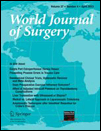Close Association of Metastasis-Associated Protein 1 Overexpression with Increased Angiogenesis and Poor Survival in Patients with Histologically Node-Negative Gastric Cancer
Abstract
Background
Although metastasis-associated protein 1 (MTA1) has been recently demonstrated as a potent angiogenesis-promoting factor in various malignant tumors, its angiogenic property in gastric cancer (GC) remains unclear. This study has detected the expression of MTA1 protein in surgically resected tissues of pathologic N0 (pN0) GC and further investigated its relation with other clinicopathologic factors and tumor angiogenesis and prognosis.
Methods
MTA1 protein expression was detected immunohistochemically in 111 pN0 GC specimens. Its correlations with clinicopathologic factors and tumor prognosis were evaluated. The intratumoral microvessel density (MVD) was assessed based on CD105 antigen immunoreactivity and analyzed for correlation with MTA1 protein expression.
Results
Overexpression of MTA1 was detected in 36.04 % of patients and exhibited a significant association with tumor size and MVD. Survival analysis demonstrated that both overall (OS) and disease-free (DFS) survivals in patients overexpressing MTA1 were significantly poorer than those without MTA1 overexpression 5 years after the operation (both p < 0.001). Multivariate survival analysis demonstrated that MTA1 overexpression was an independent prognosticator for unfavorable OS and DFS (p < 0.001, respectively).
Conclusions
MTA1 overexpression is frequently observed in pN0 GC patients and is significantly associated with increased angiogenesis and poor prognosis. Detection of MTA1 protein expression may help predict the relapse and prognosis of pN0 GC. Also, MTA1 protein may form a novel target for antiangiogenic therapy.




